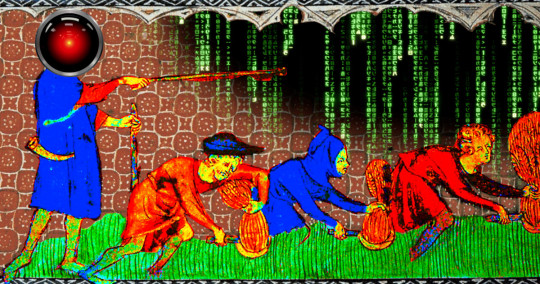#productivity theater
Explore tagged Tumblr posts
Text
AI’s productivity theater

Support me this summer on the Clarion Write-A-Thon and help raise money for the Clarion Science Fiction and Fantasy Writers' Workshop!

When I took my kid to New Zealand with me on a book-tour, I was delighted to learn that grocery stores had special aisles where all the kids'-eye-level candy had been removed, to minimize nagging. What a great idea!
Related: countries around the world limit advertising to children, for two reasons:
1) Kids may not be stupid, but they are inexperienced, and that makes them gullible; and
2) Kids don't have money of their own, so their path to getting the stuff they see in ads is nagging their parents, which creates a natural constituency to support limits on kids' advertising (nagged parents).
There's something especially annoying about ads targeted at getting credulous people to coerce or torment other people on behalf of the advertiser. For example, AI companies spent millions targeting your boss in an effort to convince them that you can be replaced with a chatbot that absolutely, positively cannot do your job.
Your boss has no idea what your job entails, and is (not so) secretly convinced that you're a featherbedding parasite who only shows up for work because you fear the breadline, and not because your job is a) challenging, or b) rewarding:
https://pluralistic.net/2024/04/19/make-them-afraid/#fear-is-their-mind-killer
That makes them prime marks for chatbot-peddling AI pitchmen. Your boss would love to fire you and replace you with a chatbot. Chatbots don't unionize, they don't backtalk about stupid orders, and they don't experience any inconvenient moral injury when ordered to enshittify the product:
https://pluralistic.net/2023/11/25/moral-injury/#enshittification
Bosses are Bizarro-world Marxists. Like Marxists, your boss's worldview is organized around the principle that every dollar you take home in wages is a dollar that isn't available for executive bonuses, stock buybacks or dividends. That's why you boss is insatiably horny for firing you and replacing you with software. Software is cheaper, and it doesn't advocate for higher wages.
That makes your boss such an easy mark for AI pitchmen, which explains the vast gap between the valuation of AI companies and the utility of AI to the customers that buy those companies' products. As an investor, buying shares in AI might represent a bet the usefulness of AI – but for many of those investors, backing an AI company is actually a bet on your boss's credulity and contempt for you and your job.
But bosses' resemblance to toddlers doesn't end with their credulity. A toddler's path to getting that eye-height candy-bar goes through their exhausted parents. Your boss's path to realizing the productivity gains promised by an AI salesman runs through you.
A new research report from the Upwork Research Institute offers a look into the bizarre situation unfolding in workplaces where bosses have been conned into buying AI and now face the challenge of getting it to work as advertised:
https://www.upwork.com/research/ai-enhanced-work-models
The headline findings tell the whole story:
96% of bosses expect that AI will make their workers more productive;
85% of companies are either requiring or strongly encouraging workers to use AI;
49% of workers have no idea how AI is supposed to increase their productivity;
77% of workers say using AI decreases their productivity.
Working at an AI-equipped workplaces is like being the parent of a furious toddler who has bought a million Sea Monkey farms off the back page of a comic book, and is now destroying your life with demands that you figure out how to get the brine shrimp he ordered from a notorious Holocaust denier to wear little crowns like they do in the ad:
https://www.splcenter.org/fighting-hate/intelligence-report/2004/hitler-and-sea-monkeys
Bosses spend a lot of time thinking about your productivity. The "productivity paradox" shows a rapid, persistent decline in American worker productivity, starting in the 1970s and continuing to this day:
https://en.wikipedia.org/wiki/Productivity_paradox
The "paradox" refers to the growth of IT, which is sold as a productivity-increasing miracle. There are many theories to explain this paradox. One especially good theory came from the late David Graeber (rest in power), in his 2012 essay, "Of Flying Cars and the Declining Rate of Profit":
https://thebaffler.com/salvos/of-flying-cars-and-the-declining-rate-of-profit
Graeber proposes that the growth of IT was part of a wider shift in research approaches. Research was once dominated by weirdos (e.g. Jack Parsons, Oppenheimer, etc) who operated with relatively little red tape. The rise of IT coincides with the rise of "managerialism," the McKinseyoid drive to monitor, quantify and – above all – discipline the workforce. IT made it easier to generate these records, which also made it normal to expect these records.
Before long, every employee – including the "creatives" whose ideas were credited with the productivity gains of the American century until the 70s – was spending a huge amount of time (sometimes the majority of their working days) filling in forms, documenting their work, and generally producing a legible account of their day's work. All this data gave rise to a ballooning class of managers, who colonized every kind of institution – not just corporations, but also universities and government agencies, which were structured to resemble corporations (down to referring to voters or students as "customers").
Even if you think all that record-keeping might be useful, there's no denying that the more time you spend documenting your work, the less time you have to do your work. The solution to this was inevitably more IT, sold as a way to make the record-keeping easier. But adding IT to a bureaucracy is like adding lanes to a highway: the easier it is to demand fine-grained record-keeping, the more record-keeping will be demanded of you.
But that's not all that IT did for the workplace. There are a couple areas in which IT absolutely increased the profitability of the companies that invested in it.
First, IT allowed corporations to outsource production to low-waged countries in the global south, usually places with worse labor protection, weaker environmental laws, and easily bribed regulators. It's really hard to produce things in factories thousands of miles away, or to oversee remote workers in another country. But IT makes it possible to annihilate distance, time zone gaps, and language barriers. Corporations that figured out how to use IT to fire workers at home and exploit workers and despoil the environment in distant lands thrived. Executives who oversaw these projects rose through the ranks. For example, Tim Cook became the CEO of Apple thanks to his successes in moving production out of the USA and into China.
https://archive.is/M17qq
Outsourcing provided a sugar high that compensated for declining productivity…for a while. But eventually, all the gains to be had from outsourcing were realized, and companies needed a new source of cheap gains. That's where "bossware" came in: the automation of workforce monitoring and discipline. Bossware made it possible to monitor workers at the finest-grained levels, measuring everything from keystrokes to eyeball movements.
What's more, the declining power of the American worker – a nice bonus of the project to fire huge numbers of workers and ship their jobs overseas, which made the remainder terrified of losing their jobs and thus willing to eat a rasher of shit and ask for seconds – meant that bossware could be used to tie wages to metrics. It's not just gig workers who don't score consistent five star ratings from app users whose pay gets docked – it's also creative workers whose Youtube and Tiktok wages are cut for violating rules that they aren't allowed to know, because that might help them break the rules without being detected and punished:
https://pluralistic.net/2024/01/13/solidarity-forever/#tech-unions
Bossware dominates workplaces from public schools to hospitals, restaurants to call centers, and extends to your home and car, if you're working from home (AKA "living at work") or driving for Uber or Amazon:
https://pluralistic.net/2020/10/02/chickenized-by-arise/#arise
In providing a pretense for stealing wages, IT can increase profits, even as it reduces productivity:
https://pluralistic.net/2024/01/11/robots-stole-my-jerb/#computer-says-no
One way to think about how this works is through the automation-theory metaphor of a "centaur" and a "reverse centaur." In automation circles, a "centaur" is someone who is assisted by an automation tool – for example, when your boss uses AI to monitor your eyeballs in order to find excuses to steal your wages, they are a centaur, a human head atop a machine body that does all the hard work, far in excess of any human's capacity.
A "reverse centaur" is a worker who acts as an assistant to an automation system. The worker who is ridden by an AI that monitors their eyeballs, bathroom breaks, and keystrokes is a reverse centaur, being used (and eventually, used up) by a machine to perform the tasks that the machine can't perform unassisted:
https://pluralistic.net/2023/04/12/algorithmic-wage-discrimination/#fishers-of-men
But there's only so much work you can squeeze out of a human in this fashion before they are ruined for the job. Amazon's internal research reveals that the company has calculated that it ruins workers so quickly that it is in danger of using up every able-bodied worker in America:
https://www.vox.com/recode/23170900/leaked-amazon-memo-warehouses-hiring-shortage
Which explains the other major findings from the Upwork study:
81% of bosses have increased the demands they make on their workers over the past year; and
71% of workers are "burned out."
Bosses' answer to "AI making workers feel burned out" is the same as "IT-driven form-filling makes workers unproductive" – do more of the same, but go harder. Cisco has a new product that tries to detect when workers are about to snap after absorbing abuse from furious customers and then gives them a "Zen" moment in which they are showed a "soothing" photo of their family:
https://finance.yahoo.com/news/ai-bringing-zen-first-horizons-192010166.html
This is just the latest in a series of increasingly sweaty and cruel "workplace wellness" technologies that spy on workers and try to help them "manage their stress," all of which have the (totally predictable) effect of increasing workplace stress:
https://pluralistic.net/2024/03/15/wellness-taylorism/#sick-of-spying
The only person who wouldn't predict that being closely monitored by an AI that snitches on you to your boss would increase your stress levels is your boss. Unfortunately for you, AI pitchmen know this, too, and they're more than happy to sell your boss the reverse-centaur automation tool that makes you want to die, and then sell your boss another automation tool that is supposed to restore your will to live.
The "productivity paradox" is being resolved before our eyes. American per-worker productivity fell because it was more profitable to ship American jobs to regulatory free-fire zones and exploit the resulting precarity to abuse the workers left onshore. Workers who resented this arrangement were condemned for having a shitty "work ethic" – even as the number of hours worked by the average US worker rose by 13% between 1976 and 2016:
https://pluralistic.net/2024/01/11/robots-stole-my-jerb/#computer-says-no
AI is just a successor gimmick at the terminal end of 40 years of increasing profits by taking them out of workers' hides rather than improving efficiency. That arrangement didn't come out of nowhere: it was a direct result of a Reagan-era theory of corporate power called "consumer welfare." Under the "consumer welfare" approach to antitrust, monopolies were encouraged, provided that they used their market power to lower wages and screw suppliers, while lowering costs to consumers.
"Consumer welfare" supposed that we could somehow separate our identities as "workers" from our identities as "shoppers" – that our stagnating wages and worsening conditions ceased mattering to us when we clocked out at 5PM (or, you know, 9PM) and bought a $0.99 Meal Deal at McDonald's whose low, low price was only possible because it was cooked by someone sleeping in their car and collecting food-stamps.
https://www.theguardian.com/us-news/article/2024/jul/20/disneyland-workers-anaheim-california-authorize-strike
But we're reaching the end of the road for consumer welfare. Sure, your toddler-boss can be tricked into buying AI and firing half of your co-workers and demanding that the remainder use AI to do their jobs. But if AI can't do their jobs (it can't), no amount of demanding that you figure out how to make the Sea Monkeys act like they did in the comic-book ad is doing to make that work.
As screwing workers and suppliers produces fewer and fewer gains, companies are increasingly turning on their customers. It's not just that you're getting worse service from chatbots or the humans who are reverse-centaured into their workflow. You're also paying more for that, as algorithmic surveillance pricing uses automation to gouge you on prices in realtime:
https://pluralistic.net/2024/07/24/gouging-the-all-seeing-eye/#i-spy
This is – in the memorable phrase of David Dayen and Lindsay Owens, the "age of recoupment," in which companies end their practice of splitting the gains from suppressing labor with their customers:
https://prospect.org/economy/2024-06-03-age-of-recoupment/
It's a bet that the tolerance for monopolies made these companies too big to fail, and that means they're too big to jail, so they can cheat their customers as well as their workers.
AI may be a bet that your boss can be suckered into buying a chatbot that can't do your job, but investors are souring on that bet. Goldman Sachs, who once trumpeted AI as a multi-trillion dollar sector with unlimited growth, is now publishing reports describing how companies who buy AI can't figure out what to do with it:
https://www.goldmansachs.com/intelligence/pages/gs-research/gen-ai-too-much-spend-too-little-benefit/report.pdf
Fine, investment banks are supposed to be a little conservative. But VCs? They're the ones with all the appetite for risk, right? Well, maybe so, but Sequoia Capital, a top-tier Silicon Valley VC, is also publicly questioning whether anyone will make AI investments pay off:
https://www.sequoiacap.com/article/ais-600b-question/
I can't tell you how great it was to take my kid down a grocery checkout aisle from which all the eye-level candy had been removed. Alas, I can't figure out how we keep the nation's executive toddlers from being dazzled by shiny AI pitches that leave us stuck with the consequences of their impulse purchases.

If you'd like an essay-formatted version of this post to read or share, here's a link to it on pluralistic.net, my surveillance-free, ad-free, tracker-free blog:
https://pluralistic.net/2024/07/25/accountability-sinks/#work-harder-not-smarter

Image: Cryteria (modified) https://commons.wikimedia.org/wiki/File:HAL9000.svg
CC BY 3.0 https://creativecommons.org/licenses/by/3.0/deed.en
#pluralistic#productivity theater#upwork#ai#labor#automation#productivity#potemkin productivity#work harder not smarter#scholarship#bossware#reverse centaurs#accountability sinks#bullshit jobs#age of recoupment
462 notes
·
View notes
Text
maybe I am just sentimental and easily impressed but tbh I disagree with the whole “yes local theater is almost always bad but it’s still important” thing bc I think a lot of local and amateur theater is really good actually! like yes I also agree that it’s important to support local arts no matter what the quality so I don’t think it’s necessarily a bad message but I also think if we really want people to go out and support community theater it’s also important to remember that there is a lot of talent outside of broadway or major touring productions so yeah going to see community productions is not something I feel I need to begrudgingly do just out of principle it’s something I genuinely enjoy.
#even school productions which probably get the most shit can be great imo#sorry i know it's easy to dunk on these kind of shows but i think it's wrong!#anyway this is long but basically i love theater <3#personal
12K notes
·
View notes
Text
Aabria’s conversations with the D20 art department be like:
Aabria: Can I cut a hole in the table?
Rick Perry: No.
Aabria: Okay, what about a hyper realistic zombified bear carcass?
Rick Perry:….we can probably figure something out
Aabria: Now, what about talking to the DM screen?
Rick Perry:……..I have no idea what you could possibly mean but tell me more
#dimension 20#d20#aabria iyengar#the production design QUEEN#she owns my entire theater kid heart#mismag
843 notes
·
View notes
Text










JEREMY JORDAN timeline (broadway, off-broadway & west end)
#jeremy jordan#jeremyjordanedit#any shows u don't see here weren't official off/bway or west end ie finding neverland death note prev productions of newsies or b&c etc#musicals#musicaledit#musicalsedit#bwayedit#broadwayedit#bonnie & clyde#the great gatsby#tgg#tgg musical#lsoh#little shop of horrors#waitress#waitressedit#american son#newsies#newsiesedit#jack kelly#wss#west side story#rock of ages#gif#timeline#broadway#bway#musical theater#musical theatre#musicaltheateredit
627 notes
·
View notes
Text

Jack Bauer???
#tto#the trail to oregon#trail to oregon#jeff blim#starkid#team starkid#starkid productions#team starkid productions#musical theater#musical theatre
552 notes
·
View notes
Text

Quick DEH doodle after watching the show
#dear evan hansen#based on the korean production#deh#deh fanart#evan hansen#connor murphy#not ship art#my art#doodle#musical theater#musical fanart
476 notes
·
View notes
Text
Do you think the side of tiktok that’s obsessed with butch greaseball knows that female Spot Conlon was in that same theater about a year and a half ago

#to be clear I am also on Butch greaseball tok#newsies#newsies uk#uksies#starlight express#starlight express uk#spot conlon#greaseball#if I had a nickel for every time a production at troubadour wembley#turned a tough guy male character into a woman#i’d have two nickels#which isn’t a lot but it’s wonderful that it’s happened twice#idk if there’s any crossover on the creative teams for the two shows#but I find the fact that they were in the same theater funny#shush sami#troubadour wembley theater
258 notes
·
View notes
Text
The hot new thing on Tumblr was the 2008 Royal Shakespeare Company production of King Lear with Ian McKellen, so every meme and reaction image was just screencaps from King Lear.
#dream#text#March 2nd 2024#royal shakespeare company#shakespeare#king lear#production#play#theater#ian mckellen#meme
612 notes
·
View notes
Text
Even better, i got curious and turns out they happened to be there for google twice


#starkid#starkid productions#cinderellas castle#starkid cc#cinderella’s castle#starkid cinderella's castle#starkid cinderellas castle#el portal theater#theyve hit the big time lol#nerdy prudes must die#npmd#starkid npmd
112 notes
·
View notes
Text
Starkid Fandom Survey!!
Hey Starkids! As part of my Writing 2 course I'm constructing a Subculture Report centering around the Starkid Fandom. If you could all fill out this form before the end of March 14 that would be greatly appreciated. This form will be used as part of my Subculture Report to analyze the demographics of the Starkid Fandom and opinions toward Starkid Productions as a whole. Responses will be collected until Friday, March 14 at 11:59 pm PDT.
Thank you :)
Reblog for larger sample size
#starkid#team starkid#starkid productions#hatchetfield#the guy who didn't like musicals#tgwdlm#nerdy prudes must die#npmd#survey#starkid musicals#hatchetverse#musical theatre#musical theater
66 notes
·
View notes
Text

My dream role is Davey Jacobs! (Edit: Now its Paul Matthews tgwldm)
(Tell me yours in notes/tags)
#theater kid#theater kids#musical theatre#hamilton#newsies#into the woods#broadway#musical#broadway musicals#west end#in the heights#something rotten#the guy who didn't like musicals#falsettos#the trail to oregon#newsies musical#newsies broadway#starkid npmd#starkid productions#starkid#beetlejuice#heathers#sound of music#twisted#wonderland musical#dear even hanson#avenue q#little shop of horrors#beetlejuice musical#beetlejuice lydia
423 notes
·
View notes
Text


Bernadette Peters for the stage production of La Strada (1969)
183 notes
·
View notes
Text


(and oh, oh) he’ll never learn to read! (and oh, oh) he’s never gonna breed! (and oh, oh) going to jail guaranteed!
#shoutout to janes who bite#*mine#*gif#choir kids#ocean o'connell rosenberg#jane doe#jane doe rtc#jane & ocean#wtwn#ride the cyclone#rtc#ridethecycloneedit#rtcedit#musicaledit#theatreedit#musicaltheatreedit#productions#station theater#station theatre
78 notes
·
View notes
Text
There’s an interesting tension in complaints about capitalism or executive meddling for marketability purposes ruining tv and film, just because they are two of the most capital-intensive art forms ever devised. You can write a novel for the cost of pen and paper, or more realistically these days a cheap netbook. Painting or sculpture or other static visual media can be more expensive, but the initial capital outlay is like hundreds of bucks, or if you really need particular tools, thousands.
Meanwhile a film on a hilariously small shoestring budget can run tens of thousands of dollars—you gotta pay for actors and equipment rental and stuff. And more ambitious projects basically require the backing of large production companies, who—if they do not concern themselves with marketability—may rapidly cease to be large production companies.
And on top of all this, the scale of such productions means they are inherently collaborative in nature. That’s been true of performance arts for centuries, of course, but when a key element of your production is the Money Guy, it makes sense he has to worry about his ability to be the Money Guy on similar projects in the future. And given the vagaries of show business, and that there are way more consistent ways to make money, I don’t think there are many people in the business of film or TV or for that matter theater production who don’t care about the medium to some degree.
And in some ways capitalism is the ideal system to produce big film and TV productions in, at least for the would be auteur. If capital is allocated solely by private whim, you just need to get one loaded producer on your side to realize your vision—you don’t necessarily need to justify the existence of your art to a philistine public, or to bean-counting government bureaucrats, or to the people who process grant applications at arts funding councils.
Still, loaded producers are in limited supply, and it’s much easier to get their attention for your non commercial vanity project if you are already famous and well respected as a director. It’s not a system optimized for producing really top notch art! But the problem of where to get the money can only be shifted around, while actors and animators and sound technicians and so on and so forth are a finite resource.
(Notably the auteur’s incentives are in many ways directly opposed to the acting and technical staff’s incentives—a world where even big name actors get paid peanuts or are replaced entirely by computers is a world that removes a lot of financial limits on an auteur’s creative vision! Of course a lot of directors and showrunners want their employees to be paid well; they recognize there is more to making TV and film than minimizing costs. But in terms of the labor economy of show business, the auteur or showrunner is management, not labor, and auteur theory is a justification of that arrangement.)
#I assume a lot of this applies to stage productions as well#my impression is that theater is cheaper than film and tv#but still can be incredibly expensive depending on how elaborate you want to go#though one advantage theater has#is that people don’t demand high levels of verisimilitude#so there is much more appetite for high concept storytelling#with minimalist production values
57 notes
·
View notes
Text

very normal group of queer people chilling on modern day earth
gung ho guns version
#i built a whole modern au on my head while sketching these pls talk to me about Trigun guys#sketched modern gung ho guns bc I was tired of preppy/jock knives propaganda#and then sketched this one#but finished this one first bc I have character biases#wanted Meryl to be giving corporate goth but she’s giving community theater production of heathers I cannot escape my roots#Trigun#Trimax#trigun maximum#Trigun 98#vash saverem#vash the stampede#nicholas d wolfwood#wolfwood#meryl stryfe#milly thompson#polygun#bc everything’s polygun 2 me#rill’sart
523 notes
·
View notes
Text
me: posts popular/crowd pleasing au ideas that people seem excited about and want to read
also me: my next fic is going to be about Agatha being 9 months pregnant and directing a high school production of the crucible
#rio is the soccer coach and is helping her put out fires#somehow the continued existence of the theater department depends on this production of the crucible
58 notes
·
View notes